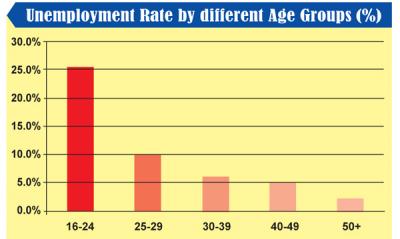I’m not the only one thinking that Mauritius could be on the verge of an unemployment crisis among its youth. In reality, that unemployment problem has been here for many years but it had, so far, been masked by a high emigration rate among young Mauritians. Most of us know at least one fellow countryman or woman who has decided to move abroad because of the dim professional and social prospects of this country over the last few decennials. Melbourne, Cape Town, Paris, London, Montreal have historically been popular host cities for the thousands of young Mauritians who emigrate but in recent times, the trend has reversed as poor worldwide economic conditions have led to a significant pullback in opportunities outside of Mauritius. And this is being reflected in our unemployment statistics.
Who is to blame?
Traditionally, over the last ten years, the unemployment rate for those between 16 and 24 years old has been close to 20% but in recent years, there has been a constant increase in that rate such that the unemployment rate in that age category is now above 25%. Also, the unemployment rate for those between 25 and 29 years old is an alarming 10% and rising! Who is to blame?
The 2008 Financial Crisis and the ensuing recession! That is the classic answer you should expect from your mainstream politicians. After all, they are never to be blamed. But are they right? In all fairness, the worldwide economic crisis has been harsh on most countries and part of the rise in youth unemployment has to do with it but only part. As highlighted earlier, the employment crisis among those leaving the formal educational stream has always been here but has never been as visible as it is today. The economic recession has had two major impacts on the unemployment situation – one, it has slowed down our highly Europe-dependent economy and thus curtailed employment creation and, two, it has limited the emigration opportunities drastically such that the true extent of the problem is about to be revealed.
Addressing the unemployment problem among the youth
Unless we proceed with major transformative measures for our economy and society, this unemployment issue is here to stay and this could possibly have a lasting ‘scarring’ impact on those most affected by it, the youth. The term ‘Lost Generation’ has been extensively used across the world to describe generations which remain chronically unemployed and we must do our utmost to ensure that such a phenomenon does not materialise here. We need to act, and we need to act fast!
Rezistans ek Alternativ is deeply concerned with the present situation and as such, is placing a special emphasis on the younger population of Mauritius in its electoral programme. To address the issue of youth unemployment, we are proposing a series of measures which should alleviate and correct the fundamentals of such unemployment including the creation of a new pillar for our economy in the form of a ‘Sustainable Blue Economy’, the emergence of innovation-driven enterprises and tertiary education programmes to incentivise those in their twenties to choose new careers. But those can only be medium term solutions and won’t address the current problem over the short term.
Temporary freeze of the retirement age at 62 years old
Extraordinary times warrant extraordinary measures! With this in mind, we are also proposing the temporary freeze of the progressive increase in the retirement age to 65 by 2018 and thus leave the retirement age at 62 years old for the time being. Population dynamics suggest that the most opportune time to progressively increase the retirement age without creating a bottleneck on the labour market won’t be before the next five to ten years. Indeed, the number of people entering the labour force is far greater than the number of people leaving the labour force at the moment and this has been the case for many years. In an environment where one can rely on economic growth to create jobs, this vital statistic can be partially overlooked but in the current low growth environment, it would be inappropriate to overlook such dynamics.
We estimate the number of people who would have left the work force but won’t because of the progressive increase in their retirement age to 65 over the next five years to be around 40,000. Together with the inherent unfavourable population dynamics and the bleak world economy, it looks as if the youth unemployment issue could spiral out of control if nothing is done. Allow me to reiterate once more the temporary nature of this freeze in the retirement age. Economic policy has got to be reactive and dynamic if it is to be efficient in the real world.
Many will argue that the financing cost of such a measure in terms of pension contribution will prove onerous and to those, I shall say that the economic and social costs of a ‘Lost Generation’ will be even worse. Prevention is better than cure…
Youth Unemployment – A ‘Lost Generation’ on the horizon?
EN CONTINU ↻



